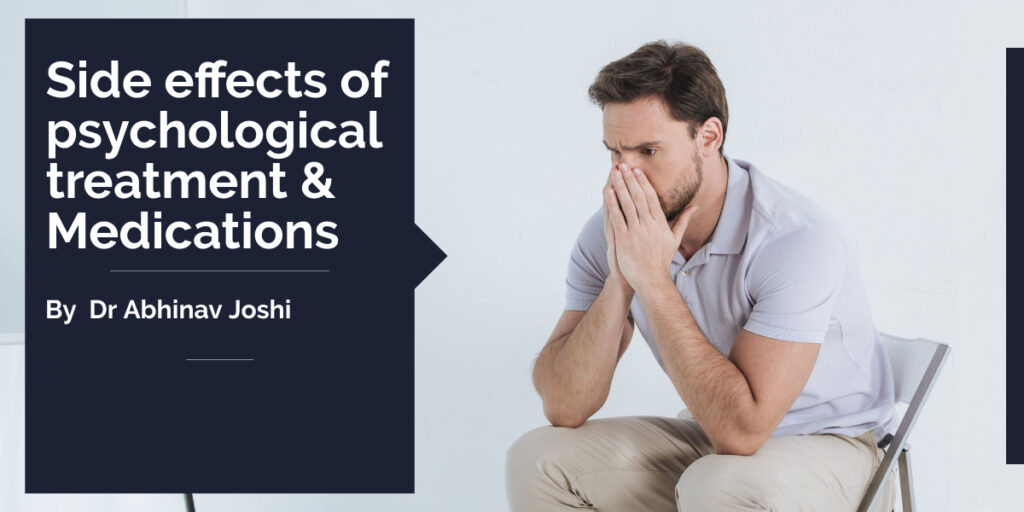Side effects of psychological treatment & medications, this is another major concern for the patients and their families. Their worries are justified, as they have seen on television, how a person suffers while he or she is given ‘shock therapy, or how the lay media or their next-door neighbour tell about the side effects. All medications and all treatments for any illness in this world have side effects, this is a fact. Even the food we eat has side effects. The long term prognosis of any illness or life itself is death which is inevitable. But what matters is the quality of life. How long a person lives or survives, he should have quality in that living. Psychiatric medications are comparatively needed to be taken for a longer time to see the desired effect. The duration may range from six months to two years to lifelong depending on the severity of the illness. It takes a few weeks for the medication to reach a therapeutic level in the brain. People are generally worried about the long duration of medication courses but we have to understand we do take lifelong common chronic illnesses like high blood pressure, high cholesterol or diabetes.
So the thing to understand is that the important thing is to create a balance. Sometimes when there is a necessary evil to be done, we choose the lesser one because, without that, the situation and quality of life would be even worse affecting the patient and the people around him. The common side effects of depression or anxiety medications are gastric symptoms like nausea, vomiting or diarrhoea. Some people tend to gain weight as the medications may also improve the person’s appetite. Some may cause lethargy, sleepiness etc. Other anti-depressants/ anti-anxiety medications can affect the various electrolytes in the blood, mainly Sodium which can cause a number of medical symptoms. I won’t be mentioning the rarer side effects as it causes unnecessary worry and anxiety. Antipsychotics are also known to cause weight gain or metabolic problems like high blood pressure, diabetes. So it is important to encourage the person who is taking these medications to be physically active and improve his diet and lifestyle. Some older antipsychotics or higher doses of these medications can cause movement disturbances ranging from restlessness to rigidity in limbs, neck or tongue. We do have medicines that are given in such situations to counter the side effects. Some antipsychotics can also affect the heartbeat rhythm or rate changes which are seen as heart wave changes on the ECG.
Mood stabilizers generally cause weight gain, liver and kidney damage (mostly in higher doses) and tremors. These three groups of medications mentioned above are mostly used in the treatment of most mental illnesses. There are ongoing new researches and the newer medications have fewer side effects and better safety profile. The take-home message is that the patient or the caregivers should communicate clearly and openly with their doctor or Psychiatrist if they experience any unusual effects as they are trained to identify the adverse effects early and take corrective action by changing the medication or the dosages. Your Doctor is the best person to manage your illness and your medications, so it is important to have a trustworthy relationship with him/her. Most people are worried when they hear the word ‘shock therapy. The clinical term used for this procedure is called ‘Electroconvulsive Therapy’ which literally means using the electric current to induce fits or seizures in a person as well as stimulating the brain. It is thought that it works by resetting certain brain activity and brain chemicals- neurotransmitters. ‘Electroconvulsive Therapy’ or ECT is generally used in severe situations like when the patient is not responding to the medications, is actively suicidal, have stopped eating or functioning completely. It has shown rapid improvement in patient’s condition as compared to before this therapy, so it in a way can be lifesaving at times.
Another thing to understand is that ECT has been used since the mid-twentieth century with good results and with time new improvements and Anesthesia, it has minimized the side effects experienced. The commonest side-effects with ECT is headache or body ache and transient memory loss of the time the person underwent ECT. Memory recovers in most cases completely.
Other new techniques of stimulating the brain are less intense, do not require anaesthesia and have lesser side effects. Examples of such techniques are ‘Transcranial Magnetic Stimulation (uses magnetic stimulation to the brain) and ‘Deep Brain Stimulation. So here I have mostly described the biological methods used in the treatment of most mental illnesses in the current world but remember as I mentioned earlier that Psychiatric treatment requires ‘Bio-Psycho-Social’ approach and I would like to add the importance of ‘Spiritual’ approach as well which we are getting to understand now and inculcating more practices in the treatment of mental illness.
Side effects of psychological treatment & medications

January 27, 2022


Leave a Reply